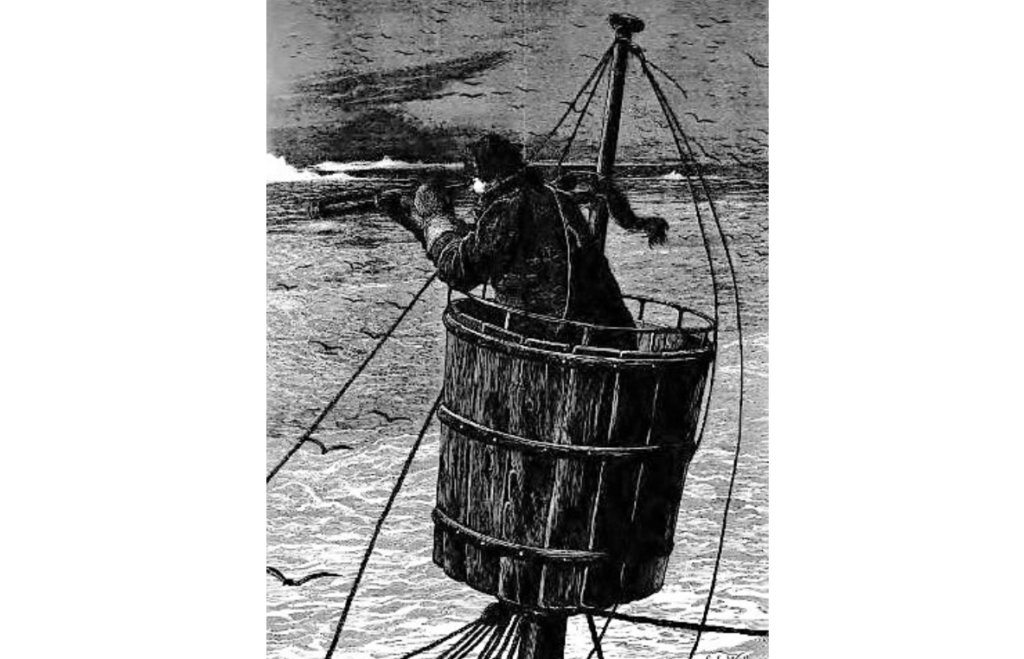This is Moby Dick Chapter 35: The Mast-Head (summary).
Vocabulary Words found in this chapter: Moby Dick Chapter 35: The Mast-Head (Vocabulary Words)
Previous Chapter: Moby Dick Chapter 34: The Cabin-Table (summary)
Ishmael’s first guard at the mast-head was during pleasant weather. Most American whalemen man their mast-heads simultaneously. They do this even if the ship has just started sailing off and it’s destination is still 15,000 miles away. They even man the mast-head even without capturing a whale on their way home, hoping that they would capture one before the ship docks.
Although the builders of the tower of Babel were prior to Egyptians, they angered God. So Ishmael declared that the first to stand on mast-heads were the old Egyptians, not those of Babel. Additionally, archaeologists generally believe that Egyptians built the first pyramids for long-legged astronomers for astronomical purposes, that’s why it has stair-like formation on each side.
In Saint Stylites, a Christian hermit spent his whole life standing at the top of a lofty stone pillar in the desert. And while he’s at the top, he hoisted his food from the ground with a tackle. Moreover, even in the frosts and rain, he remained until he literally died at his post.
For modern mast-head standers, we have Napoleon (who stood 150 feet upon the top of the Vendome Column), Great Washington (who stood on his main-mast in Baltimore), and Admiral Nelson (who stood his mast-head in Trafalgar Square).
Some might say that mast-head standers of the land shouldn’t be incorporated with those of the sea. However, Obed Macy tells us that in the early times of whale fishery, people erected long posts on the Nantucket island and it served as the mast-head. Likewise, the whalemen of New Zealand did that, too.
Anyway, when it comes to proper mast-heads (those that are found on ships), they always man it all day. These men relieve each other every two hours. Being at the mast-head is very delightful, especially when the weather is serene.
For the most part, being at sea plays a vital role in reducing stress. Besides the beautiful view and fresh air, you’ll hear no bad news, nor news about unnecessary things. Moreover, you won’t have to worry about your food for the next three years; you already have all the meals inside your casks. And lastly, your fare is set.
On the contrary, the time duration one spends at the mast-head (in a 3-4 year voyage) amounts to months. And that means a lot! Also, you won’t be comfortable at the mast-head because you possibly can’t bring your sofa or your hammock with you up there.
And unfortunately in cold weather, even wearing a thick coat won’t warm your body. One may think of it as their own house up there, but a coat is almost nothing like a house. Comparatively, it’s way thinner than the walls of a house. Besides, you can’t put drawers, closets, or a refrigerator inside your coat, right?
Nevertheless, unlike the mast-heads of a southern whale-ship, Greenland whalers have what they call “crow’s-nests” that protect them from freezing weather. In the fireside narrative of Captain Sleet1Entitled: “A Voyage among the Icebergs, in quest of the Greenland Whale, and incidentally for the re-discovery of the Lost Icelandic Colonies of Old Greenland”, he furnished all mast-head standers with his invention, the “Sleet’s crow’s nest.”

It’s fixed at the top of the mast. In it, you’ll find a comfortable seat, with a locker underneath for umbrellas and coats. Finally, you’ll see a leather rack in there where you can keep your pipe, telescope, etc. Additionally, you can always carry a rifle with you when you’re at the crow’s-nest, like what Captain Sleet did.
Although Southern whalers don’t have crow’s-nests on their ships like the Greenland whalers, it still cannot beat the perfect, beautiful view of the sea where Southerners mostly float. In addition to that, anyone at the mast-head without the crow’s nest has more freedom of going around, as opposed to being fixed at the crow’s-nest.
In the end of this chapter, Ishmael advised those who recruit whalemen not to hire romantic, or philosophic, or melancholy, or absent-minded men. Why? Because instead of carefully guarding at the mast-head, they’ll meditate random and unrelated things.
Also, who knows if a whale suddenly charges from afar to wreck their ship? So, the lives of the whole crew is at stake on mast-head lookouts! Worse, if a man will let this feeling take his guard off, he will slip and fall from the mast into the sea and drown.
End of Moby Dick Chapter 35: The Mast-Head (summary).
